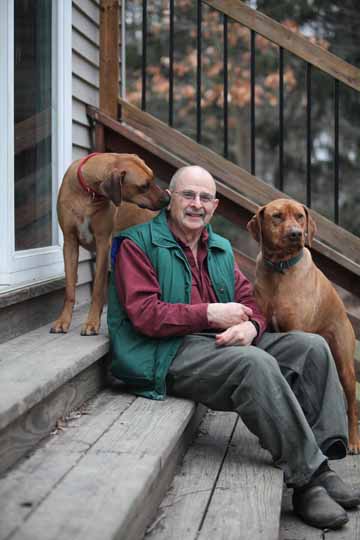By Tiffany Bentley
With an insatiable curiosity, Peter Donovick ’61 has delved into a broad spectrum of research topics.

Peter Donovick ’61
As professor of psychology and director of the environmental neuropsychology laboratory at Binghamton University, State University of New York, Donovick has studied aging and dementia, stereotype bias, multiple sclerosis, dementia, environmental toxicology, malnutrition, incarceration, compassion, health and illness, meditation, bilingualism, and the impact of pets on mood. His research has one thing in common—the human brain.
“Our laboratory was one of the few to use a mouse model to explore the negative impact of parasites on brain and behavior,” he says. “Working with Toxocara canis, the common roundworm of dogs, we found there were significant neuropathological and behavioral consequences of exposure to this parasite. Given the worldwide prevalence of dogs and their close relationship with humans, our findings have important implications.” The results were published in Science.
Since the laboratory opened in 1966, more than 500 undergraduates have been trained by Donovick and co-founder Richard G. Burright, who passed away in 2003. The vast majority have gone on to graduate or medical school.
Among these student researchers were six participants in the Lafayette Alumni Research Network (LEARN), in which Donovick has been involved for the past six years. The students participate in full-time summer research with a Lafayette graduate or associate working in the neuroscience field.
One of the LEARN Scholars, Holly Feret ’05, was involved with several studies. Her main project involved using archival data collected from prisoners and hospital patients to analyze the relationships among age, education, and I.Q. on tests of cognitive and motor processing speed. Feret, now a genetic counselor at Children’s Hospital of Philadelphia, went on to earn a M.S. in genetic counseling from Arcadia University.
“It’s a wonderful program,” Donovick says, noting that two of the students have gone on to earn doctorates. “I’m proud to have influenced their careers.”
A psychology graduate, Donovick attributes his early research interests to Howard Gallup, professor of psychology emeritus, and former professors Burt Cohen and J. Marshall Brown. “I was fortunate to have some good faculty and research experience at Lafayette,” he says.
Donovick decided to pursue an academic career after serving in the U.S. Marine Corps. “After I got out of the Marine Corps, I knew I was capable of hard, sustained work,” he says. “Survival in academia means you work long hours but you direct what you’re doing. Success and failure depend on what you do.”
Donovick holds a master’s and doctorate in psychology from University of Wisconsin-Madison and completed postdoctoral fellowships at Milton S. Hershey Medical Center and Hutchings Psychiatric Center. As a Fulbright Scholar, he learned neurorehabilitation training at Recanati Rehabilitation Center, Tel Aviv, Israel.
Also a licensed psychologist, Donovick is consulting neuropsychologist for Elmira Correctional Facility and Central New York Psychiatric Center in Marcy.

5 Comments
Thanks for the comments. To Professor Gallup: Howard, the Friday afternoon gatherings of you and students, talking about science, philosophy, life, is probably the reason I became an academic. I try to bring your joy in ideas to my students and they in turn keep me going. Thank you. Peter
Hi Peter — Wendy Hill, in her last days as provost, is giving a talk today on the history of the Psi Chi Chapter at Lafayette. She sent me some information that included bios of the first 10 members of the society. So, I read through them, bringing back many happy memories. I lost contact with all 10 of you, but was pleased to learn what you did after leaving Lafayette. So, a belated congratulations for your accomplishments; and, more personally, for all the times you baby sat for our children and some of their cousins, and the time on our roof trying not to get stung as we sprayed a wasp nest. I retired in 1995, and turned to a couple of new activities, including bicycling a lot (92,600 miles, including 30 Century Rides and a part time job as a mechanic at Genesis Bicycles in Easton and as a certified tour leader), and I returned to my piano playing, with lessons for 15 years and am now very active on the piano here, preparing for my 13th annual classical recital in June.
Kris and I have lived in Kirkland Village, a retirement community in Bethlehem, since 1999, getting older of course, but hanging in. My cycling days are over with some health issues, but I still give a couple of lectures here every year.
Best wishes to you, Howard Gallup
Agree with Jack, wonderful to see Pete’s great successes. I remember him well as a fraternity brothter. By the way Pete, I grew up in Vestal.
Pete is an incredible scientist and mentor to so many. He comes to campus to interact with our students regularly and to share his insights into many topics from prison to meditation. He is a scientist who is always looking to the world to work on problems that are meaningful and impact on people. I have greatly enjoy my interactions with Pete and I am honored to know him
Pete: Great to see a successful Fraternity Brother from Lafayette. Phi Kappa Tau class of 1961
Jack Robinson
Comments are closed.